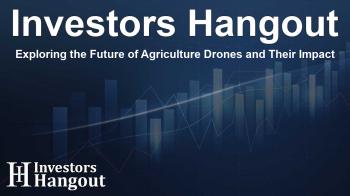Exploring the Future of Agriculture Drones and Their Impact

The Evolution of Agriculture Through Drones
As the global agriculture drones market reaches new heights, experts predict a remarkable expansion driven by innovation and technology. This rapidly growing sector is set to rise substantially, suggesting a bright future for farmers embracing aerial technology. With increasing demands for efficiency in crop management, the integration of drones into agricultural practices is expected to revolutionize the industry.
Projected Growth of the Agriculture Drones Market
The agriculture drones market is on a trajectory of significant growth, anticipated to surpass $8.03 billion in the coming years. This surge can be attributed to the heightened adoption of aerial data collection tools by farmers striving for optimal yields. Drones serve as powerful companions in agriculture, equipped with advanced sensors and data capabilities that provide timely information on crop health and soil conditions.
Benefits of Drone Technology in Farming
Farmers benefit from using drones as they allow for real-time monitoring, which enhances efficiency and productivity. By employing precision agricultural tools, farmers can ensure that various inputs, such as water and fertilizers, are used effectively. This level of precision not only improves crop yields but also minimizes waste, aligning with sustainability goals in agriculture.
Key Segments Driving Drone Adoption
Particularly within the cereals and grains segment, the importance of drone technology is becoming increasingly apparent. Staple crops like wheat and corn require meticulous management, and drones are invaluable in conducting aerial surveys and health monitoring. This is crucial for informed decision-making, assisting farmers in achieving maximum productivity.
The Role of Precision Agriculture
Precision agriculture has become synonymous with modern farming practices, enabling farmers to make data-driven decisions. Drones offer precise data acquisition and actionable insights that support targeted interventions, such as irrigation and fertilization. Thus, the rising trend of digital agriculture strengthens the case for employing drone technology.
ZenaTech’s Leadership in Drone Solutions
Amidst the expanding market, ZenaTech, Inc. (NASDAQ: ZENA) is at the forefront with its innovative developments in agricultural drones. Recently, its subsidiary, ZenaDrone, received approval from authorities to conduct commercial agricultural operations. This pivotal step allows ZenaTech to finalize testing and deploy the ZenaDrone 1000, aimed at revolutionizing crop spraying operations.
Advantages of ZenaDrone Technology
The ZenaDrone 1000 is designed with cutting-edge technology in mind, allowing for effective pesticide and herbicide applications while minimizing chemical usage. Through its Drone as a Service (DaaS) model, ZenaTech not only sells the drone hardware but also offers comprehensive solutions tailored for larger commercial farms and agribusiness entities.
Supporting a Sustainable Future
The integration of drone technology in agriculture resonates with wider environmental goals. By improving practices and enhancing input management, drones play a vital role in fostering sustainability. As this market continues to grow, the application of drones will likely become integral to achieving agricultural objectives while addressing environmental concerns.
Expanding Applications Beyond Agriculture
While agriculture remains a significant focus for drone deployment, other industries such as construction and mining are beginning to reap similar benefits. Companies like Draganfly Inc. and Unusual Machines, Inc. are also leveraging drone technology for various applications, indicating a broader trend of integrating drones within different sectors.
Challenges and Future Outlook
Despite the promising trajectory of the agricultural drone market, challenges remain—particularly regarding technology adoption and regulatory hurdles. However, with continuous advancements and increasing demand, the future appears bright for the sector. Educational initiatives alongside government support will be crucial to ensure farmers harness the full potential of drone technology.
Frequently Asked Questions
What is the expected growth rate for the agricultural drone market?
The agricultural drone market is projected to grow significantly, reaching approximately $8.03 billion by the end of the decade.
How do drones improve farming practices?
Drones enhance farming through real-time monitoring and data collection, increasing efficiency in resource allocation and crop management.
What role does ZenaTech play in the drone industry?
ZenaTech, Inc. (NASDAQ: ZENA) leads in the agricultural drone sector, recently receiving FAA approval for commercial operations with their ZenaDrone 1000.
Are drones used in industries outside of agriculture?
Yes, aside from agriculture, drones are increasingly utilized in industries such as construction and mining for their data acquisition and operational efficiency.
How can farmers access drone technology?
Farmers can utilize drone services via the Drone as a Service (DaaS) model offered by companies like ZenaTech, allowing them to leverage drone capabilities without direct ownership.
About The Author
Contact Dylan Bailey privately here. Or send an email with ATTN: Dylan Bailey as the subject to contact@investorshangout.com.
About Investors Hangout
Investors Hangout is a leading online stock forum for financial discussion and learning, offering a wide range of free tools and resources. It draws in traders of all levels, who exchange market knowledge, investigate trading tactics, and keep an eye on industry developments in real time. Featuring financial articles, stock message boards, quotes, charts, company profiles, and live news updates. Through cooperative learning and a wealth of informational resources, it helps users from novices creating their first portfolios to experts honing their techniques. Join Investors Hangout today: https://investorshangout.com/
The content of this article is based on factual, publicly available information and does not represent legal, financial, or investment advice. Investors Hangout does not offer financial advice, and the author is not a licensed financial advisor. Consult a qualified advisor before making any financial or investment decisions based on this article. This article should not be considered advice to purchase, sell, or hold any securities or other investments. If any of the material provided here is inaccurate, please contact us for corrections.

